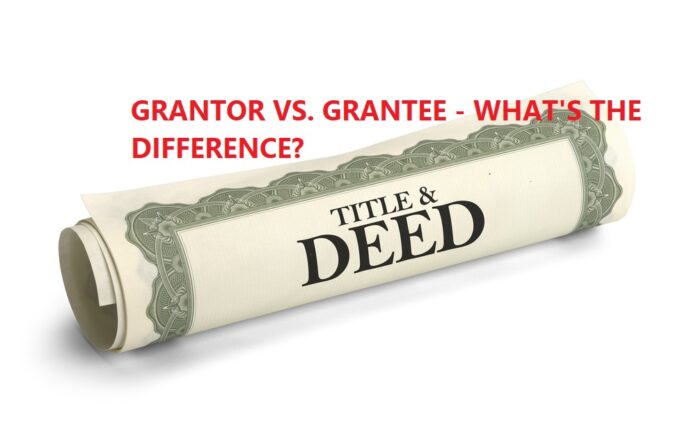GRANTOR VS. GRANTEE – When closing a real estate transaction, the terms Grantor and Grantee refer to the parties involved in selling or transferring a property. These terms are used on the property deed, a legal document that records the transfer of ownership from one party to another.
Buying a home is an exciting process that often involves a lot of daydreaming about the perfect neighborhood and the perfect house.
However, there is more to purchasing a home than just finding the “right one.” Transferring ownership rights requires a basic understanding of the legal language used in real estate. While this may sound intimidating, every future homeowner must learn the basics.
Understanding the differences between a grantor and grantee is essential in buying a home. By breaking down the vocabulary, you can navigate the legal aspects of the home-buying process with confidence and clarity.
So, whether you’re a first-time homebuyer or a seasoned real estate investor, it’s worth taking the time to familiarize yourself with the terms and concepts involved in transferring ownership rights.
The Grantor is the current property owner selling the property, while the Grantee is the property buyer. These terms can refer to individuals, groups, or organizations.
For example, a developer selling a piece of land with multiple properties to a company renting or leasing them would be the Grantor, while the company would be the Grantee. Each party has different responsibilities and obligations when it comes to the transaction.
Keep reading to know the difference between Grantor vs Grantee.
What Are Grantors And Grantees?
In a real estate transaction, two main parties are involved: the grantee and the grantor. The grantee is the individual or entity that receives the ownership rights to a property, while the grantor is the party that transfers those rights.
The specifics of the transaction and the obligations of each party may vary depending on the situation. The official documents used in the transaction, such as a deed, will detail these obligations.
What Is A Grantor?
The grantor is the individual or entity who transfers ownership of an asset in a transaction. In a real estate transaction, the grantor is the seller who conveys ownership rights of the property to the grantee, who is the buyer.
What Is A Grantee?
A grantee is the recipient of something, in this context, the buyer in a real estate transaction who receives ownership of the property after closing.
ALSO READ: Living Trust vs. Will : What is The Difference?
Key Differences Between Grantor vs. Grantee
| Grantor | Grantee | ||
| Definition | Owner or seller | Buyer | |
| Also Called as | Trustor and trustmaker, First party, settlor, patron, lessor, landlord, | Second party, beneficiary, the claimant, recipient, legatee, devised, inheritor, | |
| Rights of Property | Transfers property rights | Gets property rights | |
| Deed | Signs at the bottom of the page | made in the name of the grantee | |
| Roles | Decides clearly in the deed what gets transferred | Receives the title and deed and verifies it was filed with the county (only after checking with the clerk or the title company.) | |
| Title insurance | pays on behalf of the grantee | Should purchase |
Both the Grantor and Grantee have responsibilities in a real estate transaction, and the most crucial one is to ensure that all information on the property deed is accurate.
Common errors that can occur include:
- Listing the wrong property
- Incorrectly spelling names
- Omitting or not using the Grantor or Grantee’s legal name
- Scrivener’s errors include typos, misspellings, omissions, or accidental inclusions.
Both parties need to double-check all information on the property deed to ensure that the transaction is legal and binding.
Suppose errors are made by the attorney preparing the deed, the Grantor, or the Grantee. In that case, it can lead to issues with the property transfer, including an improper chain of title, which is the record of previous and current property owners.
This can result in others making legal claims to the property or the need to go through the process of correcting the deed.
However, an experienced attorney can address these issues by preparing an affidavit, a legal document explaining the problem and its resolution.
While the specifics of each real estate transaction may differ, the overall process remains the same: the Grantor transfers property ownership to the Grantee. Both grantors and grantees have roles to play in a real estate transaction.
Still, the most crucial responsibility is to ensure that the deed is filled out correctly to avoid any issues with the transfer of ownership.
Documents With Grantors And Grantees In Real Estate
The relationship between grantors and grantees varies depending on the context of their transaction. Various types of deeds and documents are used to establish their expectations and legally bind them. Here are a few examples.
General Warranty Deed
A warranty deed is a legal document used in real estate transactions that transfers ownership from the grantor (seller) to the grantee (buyer). It offers extra protection to the grantee by including guarantees from the grantor.
When a seller signs a general warranty deed, they guarantee no hidden problems with the property title, including issues before their ownership. If any issues arise, the grantor is responsible for covering the legal costs.
Grant Deed
A grant deed, also known as a limited warranty deed or special warranty deed in some states, facilitates property transfer between a grantor and grantee. It protects both parties but not as much as a general warranty deed.
The grant deed includes two warranties. The first is that the grantor has the right to sell the property and hasn’t sold it to anyone else.
The second is that there are no current title issues, such as liens or claims, against the property from their time as an owner. However, it does not protect the grantee from claims against the property before the grantor’s ownership.
In summary, a grant deed protects the seller from liability in the case of previous title problems and the buyer from current ones.
Quitclaim Deed
Like warranty deeds, quitclaim deeds transfer ownership from the grantor to the grantee. However, unlike warranty deeds, quitclaim deeds do not guarantee that the grantor holds a valid title to the property. Therefore, the grantee is not protected in case the grantor does not own the property or if the property has title issues.
Quitclaim deeds are typically used in specific situations, such as transferring property between family members or moving a title in or out of a trust.
Due to the lack of protection provided by quitclaim deeds, both the grantor and grantee should ensure that they are comfortable with the terms of the quitclaim deed before proceeding.
Special Warranty Deed
A special warranty deed is a type of deed that provides an additional level of protection to the grantee.
The grantor makes a guarantee to the buyer that the property was free of legal encumbrances during their ownership, meaning the grantor had paid off their mortgage, had the right to transfer ownership, and no creditors had filed a lien against the property.
However, this guarantee only applies to the grantor’s ownership period, and the seller is not responsible for any claims against the property before their ownership.
Deed In Lieu Of Foreclosure
A deed in lieu of foreclosure is an alternative option for homeowners to help prevent foreclosure. In this scenario, the homeowner voluntarily transfers home ownership to their mortgage lender.
A deed in lieu of foreclosure allows the homeowner to avoid foreclosure on their credit report and releases them from the responsibility of the mortgage.
It can benefit both parties as it allows the lender and borrower to avoid the costs and negative consequences of the lengthy foreclosure process.
The Bottom Line: Know The Difference Between Grantor And Grantee
The details of each real estate transaction differ, and the various deeds available reflect that. However, one constant is that the grantor transfers property ownership to the grantee.
I hope now you understand clearly about GRANTOR VS. GRANTEE and, the differences between them.




